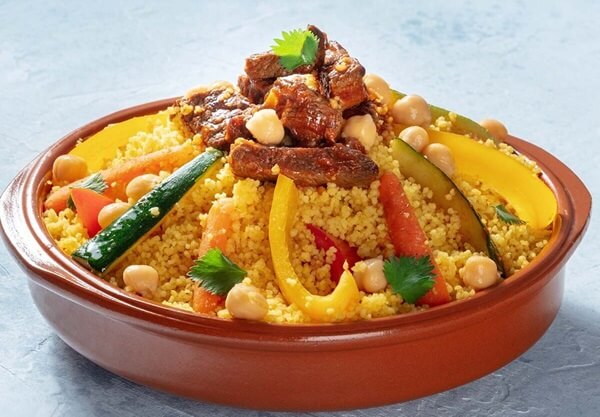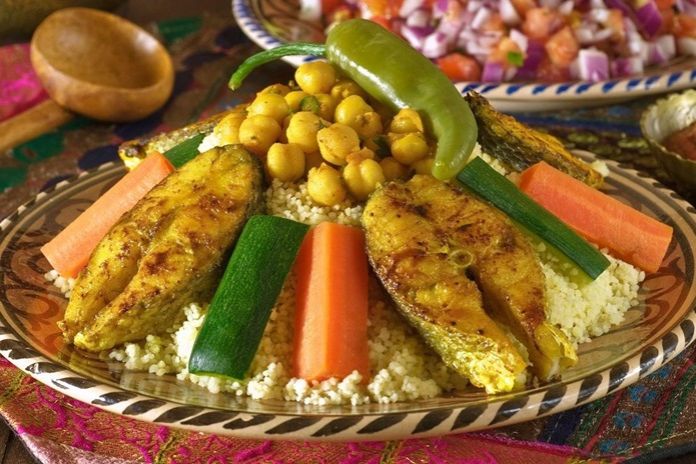National Couscous Day, observed on August 5 each year, celebrates this light, flavorful, and adaptable grain from North Africa. Couscous is quick and simple to make, and it becomes delicious when combined with herbs, spices, legumes, and vegetables. It can be enjoyed plain, mixed with salads, or brothy stews, or served alongside roasted meat, vegetables, or stir-fries. Couscous is low in calories and a good source of fiber, protein, and the antioxidant selenium. This day is an opportunity for everyone to express their love for couscous and to introduce it to others.
History of National Couscous Day
The exact origin of couscous is unknown due to lack of evidence. Since couscous is made from ground wheat, it probably didn’t exist before 6000 B.C.
There are several theories about its origins. One suggests couscous spread from North Africa to the Middle East.
Another theory is the Muslims and Sephardic Jews, expelled from Spain in the 15th century, brought couscous with them to the Middle East.
Couscous first appeared in Moorish Spanish cookbooks in the 13th century. It is popular in North Africa for both dietray and cultural reasons.
Like rice, pasta, or bread, couscous is an inexpensive and nutritious food made from wheat or other grains like sorghum, barley, corn, or millet, and it can be stored for a long time.
Couscous is very easy to cook. It can be eaten daily or served as a main course or dessert at a luxury feast using a simple cooking method. Couscous is also highly versatile, pairing well with almost anything-vegetables, legumes, meat, fish, butter, or fresh fruit.

It also represents various ethnicities and cultures and holds religious significance. In Africa, women typically prepare couscous for family feasts, which associates the dish with solidarity.
Additionally, couscous is often served during Friday and end-of-Ramadan celebrations, as well as at birth and wedding feasts.
| 13th Century (Couscous in Cookbooks) | Couscous appears in Moorish Spanish cookbooks. |
| 14th Century (Arabic Cookery Books Contain Couscous Recipes) | In his essay “Couscous And Its Cousins,” food historian Charles Perry writes that couscous originated among the Berbers of Northern Algeria and Morocco. |
| 15th Century (Christianity Pushes Out Muslims from Spain) | Jews and Muslims chased out of Spain take couscous to the Middle East. |
| 2020 (A Day to Celebrate Couscous) | The Branded Food Group (B.F.G.) Limited creates National Couscous Day to raise awareness about couscous as a tasty, versatile, and healthier alternative to rice, pasta, and noodles. |
Know Five Benefits of Eating Couscous
- While not a complete protein, couscous is a good source of protein, making it a valuable addition to plant-based diets.
- Couscous provides fiber, which promotes digestive health and helps alleviate constipation.
- Couscous is rich in vitamins and minerals, including selenium, which supports the immune system.
- Couscous offers more protein, vitamins, and minerals compared to white rice.
- Couscous is quick and easy to prepare, making it a convenient healthy food option.
Different Types of Couscous
Couscous comes in various types, each with its unique texture and flavor profile. The most common types include:
Traditional Couscous: Made from coarsely ground durum wheat semolina, this is the most common type of couscous. It has a slightly nutty flavor and a light, fluffy texture when properly cooked.
Israeli Couscous (Pearl Couscous): Larger than traditional couscous, Israeli couscous is about the size of a pea and has a chewy texture. It is often toasted before cooking, giving it a slightly nutty taste. This type of couscous is popular in Middle Eastern cuisine and is often used in salads or as a side dish.
Lebanese Couscous (Moghrabieh): Similar in size to Israeli couscous, Lebanese couscous is even larger and has a distinct, slightly chewy texture. It is often used in hearty stews and is a staple in Lebanese cuisine.
Whole Wheat Couscous: Made from whole wheat semolina, this type of couscous offers a richer flavor and higher nutritional value compared to traditional couscous. It is a popular choice for those seeking a healthier alternative.
Conclusion
In conclusion, National Couscous Day on August 5th offers a wonderful opportunity to celebrate and appreciate the rich versatility of couscous. this nutritious grain, originating from North Africa, has become a beloved staple worldwide due to its ease of preparation and adaptability in various dishes. Whether enjoyed plain, in salads, or as part of elaborate feasts, couscous provides significant health benefits, including being a good source of protein, fiber, and essential vitamins and minerals.
The diverse types of couscous, from traditional to whole wheat, cater to different culinary preferences and dietary needs. By observing National Couscous Day, we not only honor the cultural significance and traditions associated with this ancient grain but also encourage its inclusion in our modern diets as a delicious and healthy alternative to other staple foods.
Frequently Ask Question
1. What is National Couscous Day?
National Couscous Day, observed on August 5 each year, celebrates couscous, a light, flavorful, and adaptable grain from North Africa. This day encourages people to enjoy couscous in various dishes and to introduce it to others.
2. Why is couscous celebrated on this day?
National Couscous Day was created by The Branded Food Group (B.F.G.) Limited in 2020 to raise awareness about couscous as a tasty, versatile, and healthier alternative to rice, pasta, and noodles.
3. What are some ways to enjoy couscous?
Couscous can be enjoyed plain, mixed with salads, added to brothy stews, or served alongside roasted meat, vegetables, or stir-fries. It is a versatile grain that pairs well with a variety of ingredients.
4. What are the health benefits of couscous?
Couscous is low in calories and a good source of fiber, protein, and the antioxidant selenium. It also provides essential vitamins and minerals that support overall health.
You may also like to read, National Chicken Finger Day – July 27, 2024
